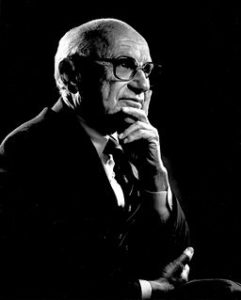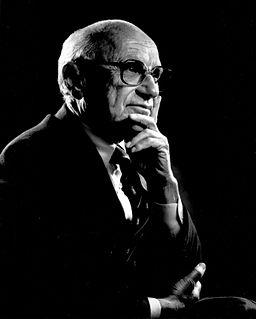
The truth is somewhere between the two extremes. While Milton Friedman has not had as much effect on economic thinking and policy as many of us free market advocates would like, he has nevertheless had a huge impact.
On economic thinking, the following of Friedman’s ideas have held up well: that monetary policy is potent; that a contraction in the money supply between 1929 and 1933 helped put the “Great” in “the Great Depression”; that inflation “is always and everywhere a monetary phenomenon”; and that there is no long-run tradeoff between inflation and unemployment. On economic policy, his attribution of inflation to monetary policy rather than to unions or corporate monopolies has strengthened the hand of the Federal Reserve in fighting inflation. In the early 1970s, he opposed President Nixon’s economy-wide price controls as a way to end inflation. Although he was arguably in the minority in the economics profession at the time, most economists today would oppose such controls and their opposition has so far helped dissuade the federal government from imposing them. His activism in the late 1960s and early 1970s to end military conscription bore fruit: the draft was ended on January 27, 1973.
This is from David R. Henderson, “Milton Friedman’s Long-run Impact,” Defining Ideas, September 9, 2021.
Another excerpt:
One of Friedman’s first big victories was on the importance of monetary policy. In a 1969 Newsweek column, when the majority of economists held the Keynesian view that monetary policy was impotent and fiscal policy was potent, MIT economist Paul Samuelson wrote:
[T]here is no sight in the world more awful than that of an old-time economist, foam-flecked at the mouth and hell-bent to cure inflation by monetary discipline. God willing, we shan’t soon see his like again.
God wasn’t willing. By the mid-to-late 1970s, Friedman’s view about the importance of monetary policy in affecting the inflation rate had become dominant. In fact, even Samuelson came to believe that monetary policy was potent. He never admitted that his view had changed or that Milton Friedman’s work had had any influence on him, but in his famous textbook, Economics, you can track his change in viewpoint edition by edition. Indeed, in my Wall Street Journal obituary of Samuelson, I did track it. By the 1985 edition, Samuelson and co-author William D. Nordhaus wrote that money “is the most powerful tool and useful tool that macroeconomic policy makers have.”
This change in economists’ views has been long-term. It’s fair to say that the majority of economists today believe that monetary policy is the main contributor to inflation.
Read the whole thing.
Here’s the Friedman bio in David R. Henderson, ed. The Concise Encyclopedia of Economics.


READER COMMENTS
Ohad Osterreicher
Sep 9 2021 at 2:59pm
Is there a way to read the obituary without subscribing to the WSJ?
Neel Chamilall
Sep 10 2021 at 8:19am
Thank you for this article, Professor Henderson.
Some time ago, I read several articles edited as a symposium in a journal under the title “Why There is No Milton Friedman Today.” All the articles were very interesting and provided plausible explanations as to why there wasn’t an economist as influential today as Friedman had been. But, I sometimes wonder if there is not another explanation, namely, that Friedman absorbed the ideas of several great economists and “synthesized” them. As he wrote himself, for example, in the Preface to the first edition of Capitalism and Freedom, the philosophy expressed in this book owed much to Frank H. Knight, Henry C. Simons, Lloyd W. Mints, Aaron Director, Friedrich A. Hayek, George J. Stigler. And he was later influenced by the Public Choice School also (this influence is obvious, for example, in his famous article “Economists and Economic Policy” published in Economic Inquiry in January 1986).
David Henderson
Sep 10 2021 at 8:31am
You’re welcome, Neel.
Yes, I remember that symposium. It was in Econ Journal Watch. I posted about it on EconLog. Also, I wrote one of the pieces.
Interesting explanation. I think that’s part of it, but not the main part.
Henri Hein
Sep 10 2021 at 2:10pm
I also enjoyed the article, so thank you.
One should not forget individual influence. Milton Friedman has had a great impact on my own intellectual journey. I suspect the same is true for many others.
I did a Google search to count hits on Friedman, Krugman, Sachs and a few others. Here are the results:
Friedman: 18 million
Krugman: 6.8 million
Sachs: 9.2 million
Paul Samuelson: 6.8 million
George Maynard Keynes: 4.1 million
Sachs did better than I expected. More than Krugman. I know it doesn’t really tell us that much, I was mostly curious – but still, with 18 million web pages mentioning him, it’s hard to argue Friedman’s influence is negligible. For those with access to Google Scholar, it would be interesting to see a more formal reference count.
Max More
Sep 12 2021 at 10:07pm
Friedman was also highly influential outside the professional economics profession. He wrote with great clarity. I didn’t see his TV show Free to Choose but read both it and the earlier Capitalism and Freedom. FtC remains one of my all-time pro-freedom books. I wish someone would do an updated version of the FtC series or something along those lines.
Comments are closed.